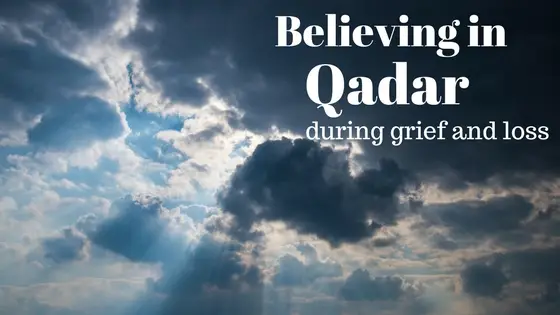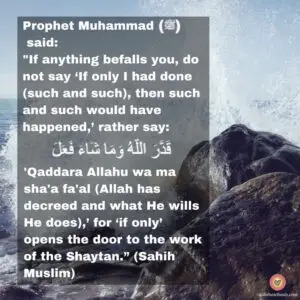
Perhaps one of the hardest things to deal with after a loss are the doubts and questions Shaytan puts into our minds or brings to us through other people around us.
Our minds sometimes go on overdrive wondering about reasons or causes, wondering if there was anything we could have done to avoid this. Sometimes those around us come to us with questions like these: Whose fault was it? Was it because of the negligence of the medical staff? Will the doctor be held to account? Why did you go to this hospital and not that one? Why didn’t you go to the hospital earlier? Was it something you or this or that person did that caused this?
While it is natural to think about reasons and causes and it is helpful to know for medical purposes and for the future, it does not help one bit to pose these questions to bereaved family members, especially when the pain is so very raw. Once something has happened, once a life is lost, once a calamity has struck, it serves no purpose to ask whose fault it was, why something was done or not done at a certain time, or to make matter-of-fact comments about what could have been done or how this ‘mistake’ could have been avoided. Especially not at the time when the family is still coming to terms with the initial shock of the loss.
We are often quick to follow Islam in other aspects of our lives, but what we forget is that this belief in Qadar or the Divine Decree is an essential part of our faith. Through this calamity, may be Allah (swt) is giving us the opportunity to perfect our belief in Qadar – to actually live that belief.
It is important to know that Allah asks us to make our best efforts to correct something or achieve a good outcome, but at the end of it all, the outcome lies only in Allah’s hand. We should make our efforts while those efforts still count, but it is important for us to know that it is not our efforts that will change the outcome. It is the decree of Allah (swt) that will come to pass.
So, once you have lost a loved one, regrets and questions about how this could have been avoided have no basis. Life and death are decreed by Allah (swt) and Allah has already decided the time of death for each person. In the midst of your pain and grief, it is very important to know that nothing you could have done could have changed this outcome, and nothing you could have done could have made them live longer. It was Allah’s decree and His decree came to pass. This was their appointed time. Illnesses and accidents become excuses for the return of the soul that has already been decreed by Allah (swt).
It was narrated that Abu Hurayrah (رضى اللهُ عنه) said: The Messenger of Allah (ﷺ) said: “The strong believer is better and more beloved to Allah than the weak believer, although both are good. Strive to do that which will benefit you and seek the help of Allah, and do not feel helpless. If anything befalls you, do not say ‘If only I had done (such and such), then such and such would have happened,’ rather say: ‘Qaddara Allahu wa ma sha’a fa’al (Allah has decreed and what He wills He does),’ for ‘if only’ opens the door to the work of the Shaytan.” (Sahih Muslim)

Allah (swt) talks about this attitude of remorse and questions like ‘if only’ in these verses:
“…They hide within themselves what they dare not reveal to you, saying: “If we had anything to do with the affair, none of us would have been killed here.” Say: “Even if you had remained in your homes, those for whom death was decreed would certainly have gone forth to the place of their death,” but that Allah might test what is in your breasts; and to purify that which was in your hearts (sins), and Allah is All-Knower of what is in (your) breasts.” (Surah Al-E-Imran 3:154)
“O you who believe! Be not like those who disbelieve (hypocrites) and who say to their brethren when they travel through the earth or go out to fight: “If they had stayed with us, they would not have died or been killed,” so that Allah may make it a cause of regret in their hearts. It is Allah that gives life and causes death. And Allah is All-Seer of what you do.” (Surah Al-E- Imran 3:156)
Accepting that this death or illness was decreed by Allah (swt) will give you a peace and tranquility that will make it easier to deal with the grief. Accepting this as the decree of Allah will set your heart on the path towards healing. This acceptance, however, does not mean that you will not feel pain or grief. Accepting this does not mean that you will not cry at the loss and at the memory of your loved one. It is ok to cry. It is ok to miss them. It is ok if it hurts. But accepting this as the decree of Allah will make you stronger and give you a peace nothing else can bring.
When Ibrahim, the son of the Prophet Muhammad (ﷺ) passed away in infancy, the Prophet (ﷺ) cried and said: “The eyes are shedding tears and the heart is grieved, and we will not say except what pleases our Lord, O Ibrahim! Indeed we are grieved by your separation.” (Sahih Bukhari)
Jabir ibn ‘Abdillah (رضى اللهُ عنه) also reported that the Prophet (ﷺ) said: “No servant of Allah will truly believe until he believes in the good and evil of Qadar and until he knows that what has befallen him could not have missed him, and what has missed him could not have befallen him.” (Sahih Sunan At-Tirmidhi)
Allah says in the Quran:
“No calamity befalls on the earth or in yourselves but is inscribed in the Book of Decrees (Al-Lauh Al-Mahfûz), before We bring it into existence. Verily, that is easy for Allah. In order that you may not grieve at the things that you fail to get, nor rejoice over that which has been given to you. And Allah likes not prideful boasters.” (Surah Al-Hadid 57: 22-23)
Imam Shafi’i (rahimahullah) is reported to have said: “My heart is at ease knowing that what was meant for me will never miss me, and what misses me was never meant for me.”
This belief in Qadar gives us a strength and peace like no other.
On the authority of Abu Abbas Abdullah bin Abbas (رضى اللهُ عنه) who said:
One day I was behind the Prophet (ﷺ) (riding on the same mount) and he said, “O young man, I shall teach you some words (of advice): Be mindful of Allah and Allah will protect you. Be mindful of Allah and you will find Him in front of you. If you ask, then ask Allah (alone); and if you seek help, then seek help from Allah (alone). And know that if the nation were to gather together to benefit you with anything, they would not benefit you except with what Allah had already prescribed for you. And if they were to gather together to harm you with anything, they would not harm you except with what Allah had already prescribed against you. The pens have been lifted and the pages have dried.” It was related by at-Tirmidhi, who said it was a good and sound hadeeth.
Another narration, other than that of Tirmidhi, reads: “Be mindful of Allah, and you will find Him in front of you. Recognize and acknowledge Allah in times of ease and prosperity, and He will remember you in times of adversity. And know that what has passed you by (and you have failed to attain) was not going to befall you, and what has befallen you was not going to pass you by. And know that victory comes with patience, relief with affliction, and ease with hardship.” (40 Hadith of An-Nawawi)
Umar Ibn al-Khattab (رضى اللهُ عنه) is reported to have said:
“No amount of guilt can change the past and no amount of worrying can change the future. Go easy on yourself, for the outcome of all affairs is determined by Allah’s decree. If something is meant to go elsewhere it will never come your way but if it is yours by destiny from you it cannot flee.”
‘Ubadah ibn as-Saamit said, “O my little son, you will never find the taste of Iman’s reality until you know that whatever caught you would not have missed you and what missed you would never have caught you. I heard Allah’s Messenger (ﷺ) say: “Indeed the first thing which Allah created was the pen and He told it to write. It asked: ‘O my Lord, what should I write?’ He said: Write the destiny of everything until the Final Hour comes.” O my little son! I heard Allah’s Messenger (ﷺ) say, “Whoever dies believing in other than this is not a true follower of mine.” (Sunan Abu Dawud, authenticated by al-Albanee)
So, as you come to terms with the grief of losing a loved one, as you try to calm the pained beat of your heart, as you wipe away those tears, know in the depths of your heart that this was something that Allah had already written for you and for your loved one. You could not have changed it. And know that this, in His Infinite Wisdom – which we may or may not understand – was the best for both of you.
May these tests be a means for us to taste the sweetness of Iman.

Pingback: Dealing With Doubts, Whys and What Ifs During Grief - As the heart heals
Pingback: When We Question the Will of Allah - Amirazz
Ameen